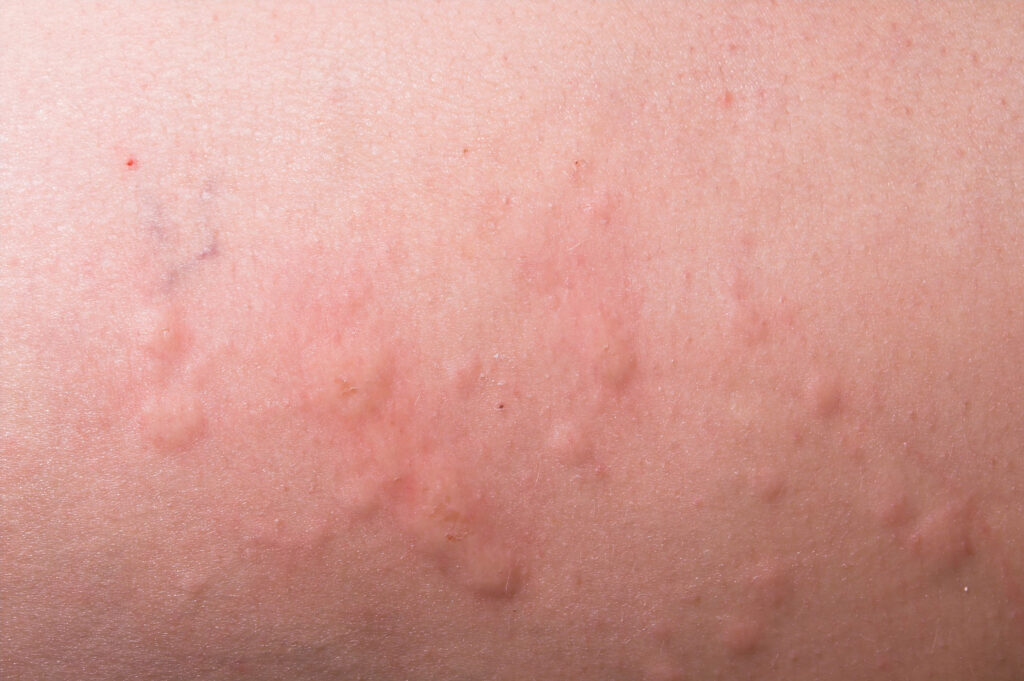Skin Allergy - Symptoms, Causes, Prevention & Homeopathic treatment

Overview
Skin allergies, or allergic dermatitis, occur when the skin reacts to substances that trigger an immune response. This reaction can cause inflammation, irritation, and a range of symptoms affecting the skin. Skin allergies are common and can affect people of all ages. They can be caused by various allergens, including environmental factors, foods, and chemicals.
Symptoms
The symptoms of skin allergies can vary depending on the allergen and individual sensitivity. Common symptoms include:
- Redness: The affected skin may appear red and inflamed.
- Itching: Itching is a common symptom and can be severe.
- Rashes: Rashes may appear as hives, welts, or patches of dry, scaly skin.
- Swelling: Swelling of the skin, particularly in the areas of exposure.
- Blisters: In severe cases, blisters or fluid-filled bumps may develop.
- Peeling: The skin may become dry, flaky, or start peeling.
When to See a Doctor
Consult a healthcare provider if:
- Severe Symptoms: The allergy causes severe itching, pain, or swelling.
- Persistent Symptoms: Symptoms do not improve with over-the-counter treatments or persist for more than a few days.
- Signs of Infection: If the affected skin becomes increasingly red, warm, or swollen, or if there is oozing or crusting.
- Systemic Reactions: If you experience symptoms beyond the skin, such as difficulty breathing or swelling of the face and throat, which could indicate a more serious reaction like anaphylaxis.
- Unknown Allergens: If you cannot identify the cause of your skin allergy or if it recurs frequently.
Causes
Skin allergies can be triggered by a variety of factors:
- Environmental Allergens: Pollen, dust mites, mold, and pet dander can cause allergic reactions.
- Contact Allergens: Common allergens include nickel, certain fabrics, latex, and fragrances found in personal care products.
- Food Allergens: Certain foods, such as nuts, shellfish, and dairy products, can trigger skin allergies.
- Chemical Allergens: Ingredients in cleaning products, detergents, and some medications can cause allergic reactions.
- Insect Stings: Bee stings and other insect bites can trigger allergic reactions in some individuals.
Risk Factors
Several factors can increase the likelihood of developing skin allergies:
- Family History: A family history of allergies or asthma can increase susceptibility.
- Personal History: Individuals with a history of allergies, eczema, or asthma are more prone to skin allergies.
- Sensitive Skin: Individuals with naturally sensitive or reactive skin are at higher risk.
- Exposure to Irritants: Frequent exposure to chemicals, pollutants, or harsh products can predispose individuals to skin allergies.
Complications
Complications from skin allergies can include:
- Secondary Infections: Scratching and broken skin can lead to bacterial or fungal infections.
- Chronic Conditions: Persistent skin allergies can lead to chronic dermatitis or eczema.
- Scarring: Prolonged or severe allergic reactions may result in skin changes or scarring.
- Sleep Disturbances: Severe itching and discomfort can impact sleep quality and overall well-being.
Preventions
Preventing skin allergies involves minimizing exposure to known allergens and maintaining skin health:
- Identify and Avoid Triggers: Keep track of potential allergens and avoid contact with them.
- Use Hypoallergenic Products: Choose skin care and cleaning products labeled as hypoallergenic or suitable for sensitive skin.
- Wear Protective Clothing: Use gloves or protective clothing when handling potential irritants.
- Maintain Skin Hygiene: Regularly cleanse and moisturize the skin to maintain a healthy barrier.
- Avoid Excessive Scratching: Scratching can worsen irritation and lead to infection.
Can Homeopathy Help?
Homeopathy offers a holistic approach to managing skin allergies by addressing the underlying imbalances and individual symptoms. Remedies are chosen based on the individual’s specific symptoms and overall health.
Common Homeopathic Remedies for Skin Allergies
A qualified homeopathic practitioner will evaluate individual symptoms and overall health to select the most appropriate remedy.
Diagnosis
Diagnosing skin allergies involves:
- Medical History: Discussing personal and family medical history, including any known allergies.
- Physical Examination: A thorough examination of the affected skin to identify characteristic features.
- Patch Testing: To determine specific contact allergens, a patch test may be conducted.
- Blood Tests: In some cases, blood tests may be used to identify specific allergen sensitivities.
Treatments
Treatment of skin allergies typically involves both avoiding allergens and managing symptoms:
Conventional Treatments
- Topical Corticosteroids: Reduce inflammation and itching in the affected areas.
- Antihistamines: Oral or topical antihistamines can help alleviate itching and swelling.
- Moisturizers: Applying emollients to maintain skin hydration and barrier function.
- Avoidance Measures: Identifying and avoiding allergens or irritants that trigger reactions.
Lifestyle and Home Remedies
Incorporating lifestyle changes and home remedies can help manage skin allergies:
- Avoid Allergens: Identify and avoid known triggers.
- Use Gentle Skincare Products: Opt for fragrance-free and hypoallergenic products.
- Moisturize Regularly: Keep skin hydrated with fragrance-free moisturizers.
- Cool Compresses: Apply cool, damp cloths to the affected areas to reduce itching and swelling.
- Healthy Diet: A balanced diet can support overall skin health and potentially reduce allergic reactions.
Preparing for Your Appointment
To make the most of your appointment:
- Document Symptoms: Keep a detailed record of your symptoms, including their onset, duration, and any potential triggers.
- Medical History: Provide information about your personal and family medical history, including any previous allergies or skin conditions.
- Questions: Prepare questions about treatment options, potential side effects, and lifestyle changes to manage skin allergies.
- Current Medications: List any current medications or supplements you are taking.

Sir my name is SHOUKATAli from Pakistan and my mom to elerjy problem skin elerjy